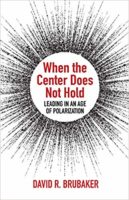In the last decade, hundreds of congregations and at least six Christian denominations in the U.S. have experienced significant conflict over acceptance of same-sex relationships. Many clergy feel caught between contending forces. What is the most helpful way for leaders to respond?
It helps to keep in mind the “congregational consultant’s creed”: the identified issue is (almost) never the real issue. While the identified issue is indeed very important, I believe that the underlying issues are the true conflict drivers in the current environment.
The six denominations most recently affected are the Church of the Brethren (COB), Episcopal Church (USA), the Evangelical Lutheran Church of America (ELCA), the Mennonite Church (USA), the Presbyterian Church (USA) and the United Methodist Church (UMC).
All but two of these denominational bodies have seen “alternative associations” emerge to welcome more traditional congregations opposed to what they perceive to be the current trajectory of their national bodies. The Anglican Church in North America (ACNA) was founded in 2009 by Episcopalians in the U.S. and Anglicans in Canada. The North American Lutheran Church (NALC) emerged in 2010 and in 2012 the “ECO: A Covenant Order of Evangelical Presbyterians” organized. Most recently, a group announced it had formed “EVANA,” a “new Anabaptist network of churches that expects to attract some who leave Mennonite Church USA.”
My colleague Susan Nienaber has said, “The denominational level, whether it’s the middle judicatory or national level, is going through a seismic shift, and the whole idea of denominationalism is going through a very profound (cultural) shift.” This seismic shift affects local congregations as much as regional and national bodies, and while the identified issue is currently focused on human sexuality and sexual orientation, the underlying issues are multiple and often historic.
What are those underlying issues? After two decades of facilitating a variety of conversations about human sexuality at congregational, judicatory, and denominational levels, I would summarize them as follows.
First, there are differing Biblical hermeneutics (methods of interpreting Scripture) at work. Those who favor full inclusion of individuals in same sex relationships in the life and leadership of the church tend to draw on historical-critical and other critical methods to understand particular passages in the style and context in which they were written. Those who counter that individuals in same sex relationships should not serve in leadership roles tend to employ an historical-grammatical approach, which may not dismiss literary style and historical context but does incline to more literal interpretations of Scripture.
In my experience, both ends of the spectrum tend to take the Bible seriously, but both ends do not take it literally. Thus, both can read the same passages and draw different conclusions as to their contemporary application.
Second, there are differing political affiliations in (nearly) every congregation, and our politics influence our theology. The Defense of Marriage Act (DOMA) was signed by Democratic president Bill Clinton in 1996, after it was passed by bipartisan majorities in both houses of Congress. But by the 2000s, the Democratic Party moved away from DOMA, while the Republican party put support for “traditional marriage” into its platform.
As the national political parties and news media have become more polarized in the last two decades, one’s political affiliation has become predictive of one’s stance on same sex relationships. While 65% of Democratic and Independent voters support same sex marriage, only 35% of Republican voters do—nearly a 2:1 margin. Those who attend our congregations are not just “congregational members,” they are also “voters” and consumers of an increasingly balkanized media (e.g., Fox News vs. MSNBC). Thus, political and societal polarization has affected most congregations and nearly all denominations.
Third, other demographic variables correlate with support of or opposition to same sex relationships. A female, college-educated, urban church member under 50 who lives in an urban community is likely to support individuals in same sex relationships serving in leadership roles in her congregation. But a man over 50 with no college degree who lives in a rural community is just as likely to oppose such service. While demographic variables are not as significant an influence on attitudes regarding same sex relationships as religious beliefs and political affiliation, they do matter.
Faced with these underlying differences, what’s a local pastor/priest/rabbi or judicatory/denominational official to do? Here are three suggestions from observing congregations that have managed to remain together despite their differences on the current identified issue of human sexuality.
- Talk more about what unites you than about what divides you. Although structured and safe conversations about human sexuality are appropriate, they need to be preceded or at least accompanied by conversations about what the congregation or organization holds in common—such as shared vision and values.
- Focus outward rather than inward. The call to a “missional focus” has become a familiar one in many denominations and congregations, and it’s a proper instinct. My own research in 100 congregations found that while several changes (such as “adding a worship service” or “restructuring the congregation”) made conflict MORE likely, only one variable made conflict LESS likely—starting a community ministry. When we focus outward rather than inward we tend to work more and fight less with each other.
- Be willing to adopt new wineskins. Despite all of our efforts to stay united, the political, demographic, and religious forces that are now buffeting many denominations and congregations are straining our old structures to the breaking point. It seems likely that the current trend of more localism (cooperation with other local congregations) and less denominationalism (loyalty to established structures and institutions) will only accelerate in the coming decade.
In sum, I believe it’s important to name that our current conflicts over human sexuality and sexual orientation are a proxy for deeper divisions at the level of theology, politics and demography. This doesn’t make the underlying divisions any easier to address, but it may help us examine the decades-long trajectory towards greater religious, political, and demographic divergence in the U.S. It also may help reduce the current undue focus in many religious systems on human sexuality in general and sexual orientation in particular. Such an obsessive focus has primarily served both to heighten anxiety and in some cases to harm individuals in same sex relationships who have participated in such “dialogues.”
There is much that divides us in our current polarized society. What unites us in our congregations are shared vision and values, a focus on ministry outside of our congregational walls, and durable relationships. As the possibilities for “association with like-minded others” proliferate, we will need to develop the discipline of staying connected with those with whom we don’t agree.
David Brubaker has consulted with organizations and congregations in the U.S. and a dozen other countries on organizational development and conflict transformation. He is the author of Promise and Peril, on managing change and conflict in congregations, and When the Center Does Not Hold, on leading in an age of polarization. David recently retired from his role as Dean of the School of Social Sciences and Professions at Eastern Mennonite University, and is now a Professor Emeritus of Organizational Studies.



